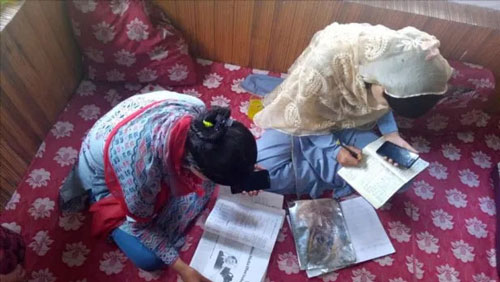Uzma Shuja has been distraught since last year when Kashmir went into another round of lockdown.
Her children — Jazah, 7, and Abdullah, 5 — were already experiencing changed behaviours and each new day was making them more timid and unsocial.
The children of Shuja, like thousands of children of their age, had gone out of normal schooling, replaced by online classes that hooked them to computers and smartphone screens. It denied them the lively, real-world experiences.
That has been mostly the case since August 2019 and the schools in Kashmir have remained shut for a record period in the world.
Education was first thrown completely off the track when New Delhi imposed a crackdown on civilian movement and communication networks as it revoked the region’s decades-long limited autonomy.
The schools didn’t open for about eight months, and when they did, the pandemic forced a renewed lockdown lasting another year.
In March 2021, when schools reopened for barely a few weeks before another round of lockdown began – forced by the second wave of the pandemic.
The unusually long period of absence from the schools has meant serious changes in the physical and mental health of children, who now remain confined inside their homes, attending classes in “an unhealthy environment of smartphones and computers” that is depriving them of socialising spaces, real world experiences, and co-curricular activities.
In their formative years, these children now risk lifetime complaints. Over two years ago, Abdullah’s schooling started with a lot of enthusiasm and entertainment when he joined a pre-school but soon his daily routine, including playing games with his classmates and going to school, came to a halt.
“I am concerned that a prolonged closure of schools is going to have a major effect on the physical and mental well being of my children,” said Shuja.
An educationist, G. M. Malik, said that “we send children to school to learn, for socialisation and currently, we lack that environment.”
He added that the society for children has remained confined now. “In school, children used to get a hydrogenous environment with other children coming from different families,” said Malik.
“There is used to be a positive growth in how they had to mix into society.” Now, the online classes have brought a lot of “stress and trauma” in millions of children across the globe including Jazah and Abdullah. “They fear studies and treat the same very negatively,” said Shuja.
She said her children started to look pale and seem to be unfit and lethargic. Not just the physical problems but she feels that the lockdowns have brought along a lot of behavioural issues in her children.
For her, restrictive measures are very important for containing this disease but it has a lasting effect on the mental health of young children. “My children are no longer the soft spoken delicate kids they used to be,” said Shuja.
The pandemic has put the world in a strange situation where even adults pass their time looking into the nothingness and their phones.
And, while the grownups have found outlets for our annoyances, children have been pushed in front of a screen for online lessons without notice.
“This age group has a very low sitting tolerance and very low attention or concentration span,” said Shuja. “Online classes have brought a lot of stress and trauma in their lives.”
Though the teachers are trying hard to make the classes interactive, it has been very difficult to maintain the pace like that of in-person lectures.
Shuja’s children have started fearing their studies and treat the learning negatively, she said.
Jazah had earlier started expressing herself by becoming talkative in school but after the lockdown, she has gone back inside her “cocoon” and is finding it hard to cope up.
Jazah, who is a shy, timid, imaginative and creative child, “traditional methods of teaching anyway don’t work with her and this online class system has pushed her in an extreme corner it seems,” said Shuja.
A year on, children are not socialising, are angry and unmotivated while sitting at home.
They are showing the effects of a pandemic life as this period of isolation has affected them. “They are struggling to stay focused,” said Shuja.
For shy children, the spotlight on them during online classes has made them more self-conscious.
Child specialist Khurshid Ahmad Wani said that “the problems in children are going to be another pandemic. They will be late in catching up with studies in the future.”
Wani’s patient count has increased and he said that as there are rarely any physical activities, children are becoming obese and lazy.
“In future, children will have metabolic syndromes,” he said. He said that the children “will develop autistic behaviour, depression, social anxiety, behavioural and temperamental issues. They will be addicted to phones.”
Like him, child psychologist Mudasir Hassan is also concerned that as much as the kid uses the phone, the more chances there are for them to develop autistic features. “Children have been mostly focusing on phones which is not right,” he said. —KMS










